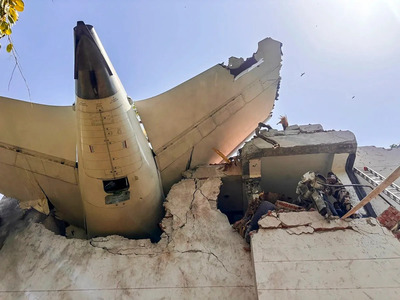U.S. Prepares to Evacuate Embassy in Baghdad Amid Rising Tensions
Voluntary departure for U.S. military families authorized as security risks increase in the Middle East.
The U.S. Department of Defense has authorized the voluntary departure of family members of U.S. military personnel from locations across the Middle East due to escalating security concerns.
A senior official stated that the safety and security of military personnel and their families remain a top priority, with Central Command closely monitoring developments in the region.
Additionally, a White House official confirmed that President Donald Trump is aware of the planned evacuation of American personnel in the Middle East, as reports emerge regarding organized evacuation preparations at the U.S. Embassy in Iraq amid increasing risks.
An Iraqi security official and a U.S. source reported that the embassy's decision aligns with a rise in security threats.
Meanwhile, Iran's Minister of Defense, Aziz Nasirzadeh, warned that Iran would target U.S. bases in the region if nuclear negotiations fail or conflict with Washington arises.
Another U.S. official indicated that the State Department intends to carry out an organized evacuation of the embassy in Baghdad, aiming to utilize commercial means for the operation, although military assistance would be available if requested.
In contrast, an Iraqi government source reported that no security indicators warranting the evacuation of U.S. embassy personnel have been recorded.
The source emphasized that security conditions suggest stability and internal safety in Iraq, asserting that all diplomatic missions in the country function securely.
The Iraqi source stated that diplomatic missions, both Arab and foreign, are able to operate with a high degree of security and freedom in communication.
They highlighted that the recent measures taken by the U.S. embassy pertain to broader diplomatic security concerns in several Middle Eastern nations, rather than exclusively affecting Iraq.
In a separate interview, President Trump expressed diminished confidence regarding Iran's willingness to halt uranium enrichment under a potential accord with the U.S., repeatedly threatening military action should an agreement not be reached.
A senior official stated that the safety and security of military personnel and their families remain a top priority, with Central Command closely monitoring developments in the region.
Additionally, a White House official confirmed that President Donald Trump is aware of the planned evacuation of American personnel in the Middle East, as reports emerge regarding organized evacuation preparations at the U.S. Embassy in Iraq amid increasing risks.
An Iraqi security official and a U.S. source reported that the embassy's decision aligns with a rise in security threats.
Meanwhile, Iran's Minister of Defense, Aziz Nasirzadeh, warned that Iran would target U.S. bases in the region if nuclear negotiations fail or conflict with Washington arises.
Another U.S. official indicated that the State Department intends to carry out an organized evacuation of the embassy in Baghdad, aiming to utilize commercial means for the operation, although military assistance would be available if requested.
In contrast, an Iraqi government source reported that no security indicators warranting the evacuation of U.S. embassy personnel have been recorded.
The source emphasized that security conditions suggest stability and internal safety in Iraq, asserting that all diplomatic missions in the country function securely.
The Iraqi source stated that diplomatic missions, both Arab and foreign, are able to operate with a high degree of security and freedom in communication.
They highlighted that the recent measures taken by the U.S. embassy pertain to broader diplomatic security concerns in several Middle Eastern nations, rather than exclusively affecting Iraq.
In a separate interview, President Trump expressed diminished confidence regarding Iran's willingness to halt uranium enrichment under a potential accord with the U.S., repeatedly threatening military action should an agreement not be reached.








